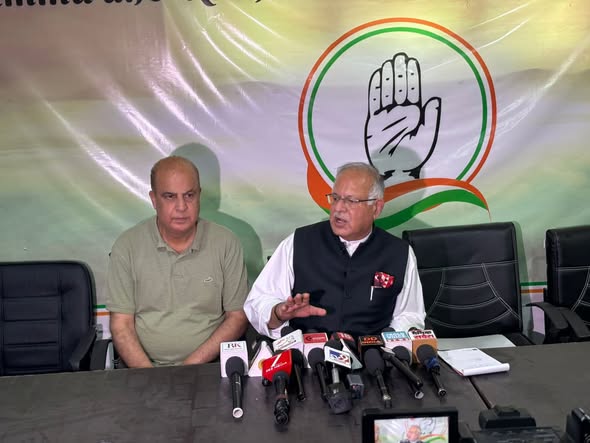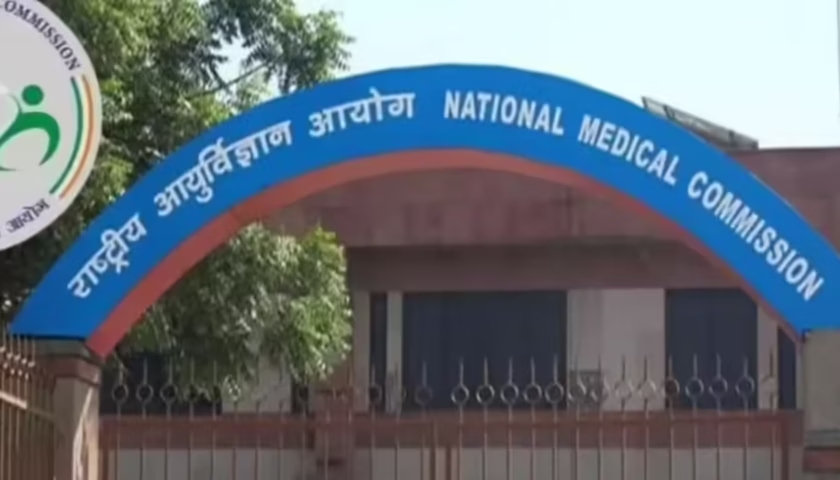Congress Rules Out Joining J&K Cabinet Until Statehood Restored
Party Demands Proportional Representation and Calls for Inclusive Governance
By: Javid Amin | 05 November 2025
Congress Stands Firm: No Cabinet Role Without Statehood
In a significant political development amid talks of cabinet expansion in Jammu and Kashmir, the Congress Party has categorically ruled out joining the council of ministers, asserting that its participation hinges on the restoration of full statehood.
The statement, made by Tariq Hamid Karra, President of the Jammu and Kashmir Pradesh Congress Committee (JKPCC), underscores the party’s principled stance. Addressing reporters in Srinagar, Karra declared,
“We have a principled stand that as long as Jammu and Kashmir doesn’t get statehood, we will not be part of the cabinet.”
This declaration comes amid growing speculation that Chief Minister Omar Abdullah may soon announce a cabinet reshuffle following recent by-elections.
For the Congress, however, the question of statehood restoration remains paramount — not merely as a political slogan but as a condition of engagement with governance. The decision resonates with the party’s national position, which continues to call for reversing the August 2019 bifurcation that downgraded Jammu & Kashmir into a Union Territory.
The Context: Statehood and Political Sensitivities
Since the abrogation of Article 370 and the dismantling of Jammu and Kashmir’s statehood in 2019, the region’s political landscape has been in flux. While elections and limited administrative autonomy have resumed, full statehood — promised by the Centre — remains elusive.
The Congress has consistently maintained that true democratic participation is incomplete without statehood, which restores legislative, administrative, and symbolic autonomy to the people of Jammu & Kashmir.
Karra’s statement aligns with this ideological line and reflects the sentiment that joining the cabinet without statehood would legitimize a diluted democratic framework — something the Congress is unwilling to do.
Political analysts note that this stance is also strategically timed, as the NC-Congress alliance remains uneasy following electoral realignments and shifting loyalties in the region. By distancing itself from the cabinet, Congress aims to retain moral authority and political distinctiveness ahead of potential assembly elections.
Representation Based on Population: Congress Echoes Rahul Gandhi’s Call
Beyond the issue of statehood, the Congress also stressed proportional representation — a theme gaining traction across national politics.
Karra stated that “each community should get representation as per their population,” a remark that reflects Rahul Gandhi’s nationwide call for caste census and equitable governance.
This is particularly relevant in Jammu and Kashmir, where ethnic, regional, and religious diversity is complex. The demand for proportional representation seeks to ensure that every group — be it from Jammu, Kashmir, or Ladakh (before bifurcation) — receives fair political and administrative inclusion.
In essence, Congress’s position is not just about participation in governance, but about reshaping governance itself to reflect social justice and demographic realities.
The Dynamics with Omar Abdullah’s NC
Chief Minister Omar Abdullah had hinted at an upcoming cabinet expansion to accommodate wider representation, particularly after the recent by-elections. However, the Congress’s refusal to participate places the NC-led coalition in a delicate position.
While the two parties have shared a working relationship in the past, their ideological differences on autonomy and representation are becoming increasingly pronounced.
Sources within the political establishment suggest that the NC may now look toward independent MLAs or smaller regional allies to fill ministerial posts, maintaining stability without Congress’s direct involvement.
However, this also means less coordination on policy priorities and greater friction within the governing structure. The Congress’s abstention effectively sends a message that statehood restoration remains a non-negotiable demand — not only to the NC but also to New Delhi.
Political Implications: Shifting Power Equations
The Congress’s hardline stance has far-reaching implications for Jammu and Kashmir’s political future.
-
Moral Positioning:
By refusing to join the cabinet, Congress positions itself as the party of principle, prioritizing constitutional integrity over power politics. -
Opposition Recalibration:
The move may consolidate opposition forces around the statehood demand, forcing the NC and others to publicly clarify their own commitments to autonomy. -
Message to the Centre:
It serves as a direct message to the BJP-led central government, reminding it of the pending promise to restore statehood — a commitment repeatedly mentioned in parliamentary debates but delayed in execution. -
Voter Sentiment:
Public sympathy may grow for Congress among sections disillusioned with both regional governance and central control, giving the party a renewed electoral foothold. -
Coalition Uncertainty:
The NC-Congress understanding, already tenuous, may face further strain, particularly if Congress begins an independent campaign for statehood and representation across J&K districts.
A Demand Rooted in Democratic Values
The Congress’s insistence on statehood is not just about administrative power — it’s about democratic dignity.
Statehood restores the people’s ability to govern their land, control resources, and make policy decisions reflective of local aspirations. The downgrade to Union Territory status, in contrast, places much of the power in the hands of the Lieutenant Governor and central bureaucrats, reducing the autonomy of elected representatives.
For Congress, therefore, the refusal to join the cabinet is a symbolic protest — a statement that governance must first be grounded in consent and equality, not compromise.
The Representation Debate: Beyond Numbers
While Karra’s comment on proportional representation may appear straightforward, it touches upon deep-rooted structural issues.
The call for “representation as per population” directly connects to Rahul Gandhi’s advocacy for a nationwide caste census, an issue that has reignited political discourse in India. In J&K, such an approach could lead to redrawn political priorities, with marginalized and underrepresented groups demanding greater participation in governance.
Experts argue that fair representation could balance Jammu’s and Kashmir’s distinct concerns — from economic inequality and unemployment to religious and regional imbalances.
The Congress sees this as a step toward inclusive governance, rather than token appointments that merely appease dominant groups.
What Comes Next for J&K Politics
As cabinet expansion looms, Congress’s non-participation forces the ruling alliance to rethink its strategy.
-
NC’s Challenge: Omar Abdullah’s administration must now navigate governance without Congress’s institutional support while managing coalition optics.
-
Congress’s Path: The party is expected to intensify its campaign for statehood through public rallies, grassroots mobilization, and coordination with other like-minded opposition blocs.
-
Centre’s Dilemma: The BJP-led government at the Centre faces renewed pressure to deliver on its commitment to statehood, especially with Lok Sabha elections approaching.
This political impasse could either stall administrative reform or spark a new political awakening, depending on how public sentiment evolves.
Bottom-Line: A Defining Moment in Jammu & Kashmir’s Democratic Journey
The Congress’s refusal to join the cabinet is more than a tactical decision — it’s a statement of democratic intent.
By tying participation to statehood restoration, the party repositions itself as a defender of constitutional rights and regional dignity. Its demand for population-based representation adds another layer to the evolving discourse on social justice, inclusion, and accountability.
As J&K continues to navigate the post-2019 political terrain, these debates will shape not just governance, but also identity and autonomy in the region.
In a landscape where every political gesture carries symbolic weight, Congress’s stand might well be remembered as a turning point — a moment when the call for representation, equality, and statehood once again defined the soul of Jammu and Kashmir’s politics.




